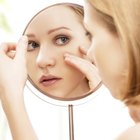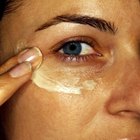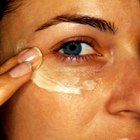
Jupiterimages/Pixland/Getty Images
Many people who experience acne still have to suffer after breakouts are over. For those with skin that scars easily, it is even harder to achieve beautiful, smooth skin. There are solutions for treating and improving the look of acne-scarred skin, and one treatment is Tri-Luma.
Why Acne Scarring Occurs
Acne scarring can occur for a number of reasons. When people pick at pimples, they may become infected and cause scars. In addition, people with darker skin often are more prone to scarring due to the higher level of melanin in their skin.
Common Treatments for Scarring
Often people who have acne scars may undergo microdermabrasion, acid peels or laser treatments to alleviate the signs of scarring.
What is Tri-Luma?
Tri-Luma is a cream that must be prescribed by a doctor. It contains these three active ingredients: fluocinolone acetonide, hydroquinone and tretinoin. These ingredients can effectively fade acne scars.
Effectiveness of Tri-Luma
Tri-Luma has been shown to be effective in treating acne scarring and melasma (skin darkening caused by hormones) in a short period of time. Many users report seeing results within a couple of weeks.
Warnings
Negative side effects do not seem to be very common with Tri-Luma although users may experience skin dryness, irritation or peeling. In addition, it is imperative that sunscreen is used everyday when using Tri-Luma in order to maintain the positive results.
Related Articles

The Adverse Effects of Body Creams and ...

Benefits of Shea Butter and Coconut Oil ...

How to Prevent Pock Holes From ...

Removing Acne Scars With Tretinoin Cream

The Difference Between Retin A & Renova

How to Cure Razor Burn on a Woman's ...

Skin Care Products That Contain ...

The Best Facial Moisturizers for People ...

List of Retinoids

How to Reduce Acne Inflammation

How to Remove Red Scars on Your Face

How Long After Shaving Do You Develop ...

Acai Berry & Acne

How to Get Rid of Purple Scars

Can Age Spots Be Reversed?

How to Even Out Skin Tone Without Makeup

How to Use Vaniqa Cream

Alternatives to La Mer Creme

How to Use Copper Peptide With Vitamin C

Estrogen in Skin Creams
References
Writer Bio
Patrice Drakeford is an experienced writer who has been in the freelance industry since 2005 and has been published on a number of websites including eHow, Associated Content and DIY Chatroom. She holds a bachelor's degree in business from The University of Michigan and a master's in business administration from California State University, Los Angeles.
Photo Credits
Jupiterimages/Pixland/Getty Images